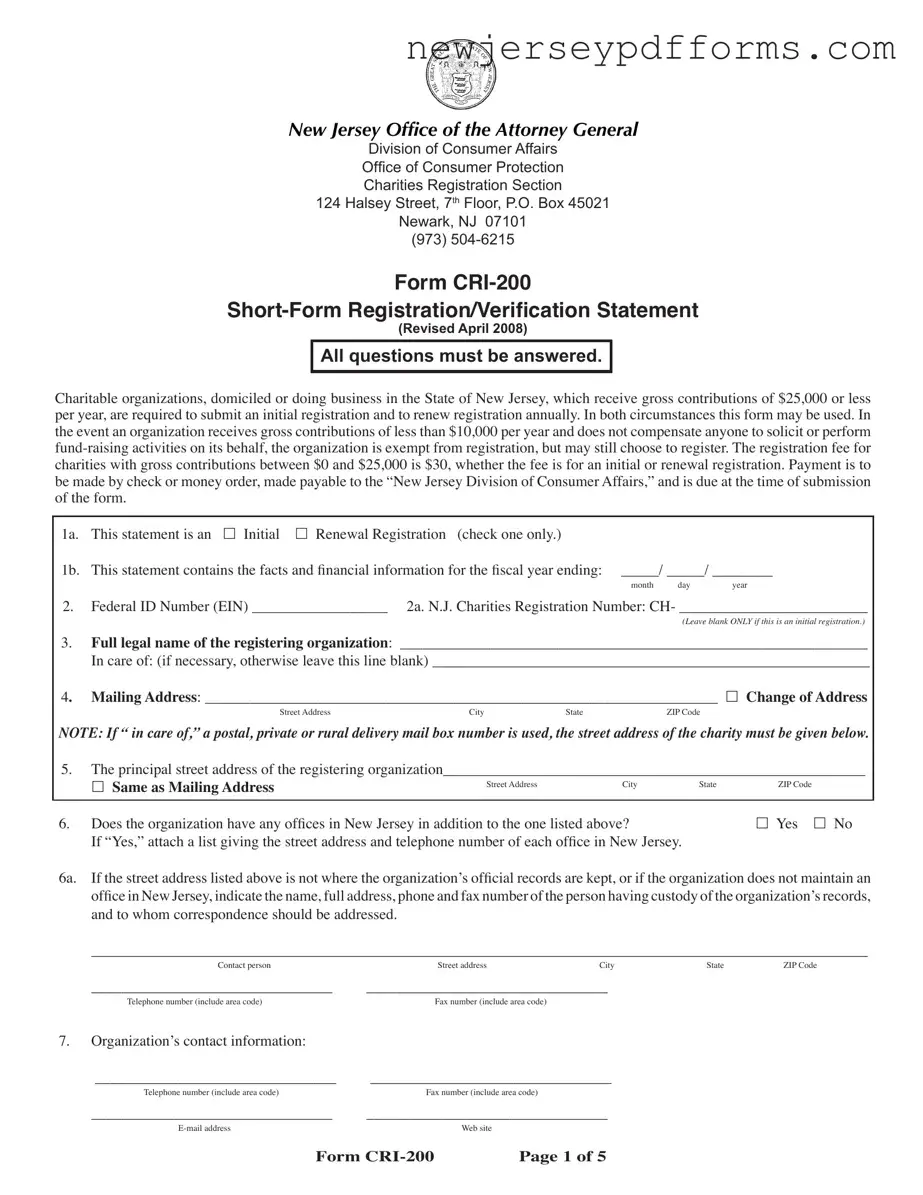The Form CRI-150-I serves as the Long-Form Initial Registration Statement for charitable organizations in New Jersey. Unlike the CRI-200, which is designed for smaller charities with gross contributions of $25,000 or less, the CRI-150-I is required for organizations that exceed this threshold. This form gathers extensive information about the charity's structure, governance, and financial practices, ensuring that larger entities comply with state regulations. The CRI-150-I emphasizes detailed disclosures, such as the charity's mission, board members, and financial statements, which are critical for maintaining transparency and accountability in fundraising activities.
The Form CRI-300R is the Long-Form Renewal Statement for charities that have previously registered. This document is similar to the CRI-200 in that it requires annual updates, but it is intended for organizations that have previously filed the Long-Form Initial Registration Statement. The CRI-300R demands comprehensive information about any changes in the organization’s structure or operations since the last filing. Both forms aim to keep the state informed about the charity's activities and ensure compliance with state laws, but the CRI-300R requires a more thorough account of the charity's ongoing operations.
The IRS Form 990 is a federal tax form that most tax-exempt organizations must file annually. This form provides a detailed overview of a charity's financial activities, including revenue, expenses, and executive compensation. Similar to the CRI-200, the IRS Form 990 is a tool for transparency, allowing the public to access information about how a charity operates and manages its funds. However, the IRS Form 990 is more comprehensive and includes sections that may not be present in the CRI-200, such as detailed financial statements and governance practices.
The IRS Form 990-EZ is a shorter version of the IRS Form 990, intended for smaller organizations with less complex financial activities. Like the CRI-200, it simplifies the reporting process for charities that do not exceed certain revenue thresholds. Both forms serve to ensure that smaller organizations maintain transparency while reducing the burden of extensive reporting. However, the 990-EZ still requires essential financial disclosures, making it a valuable tool for both the IRS and the public.
Understanding financial performance is crucial for any organization, and utilizing tools such as the Profit and Loss form can aid in this process. For those seeking a structured template to help manage and report their finances more effectively, the PDF Document Service offers a valuable resource that aligns with the best practices in financial documentation.
The Form CRI-300 is used for the annual renewal of organizations that have previously filed the Long-Form Initial Registration Statement. Similar to the CRI-200, it requires updates on the charity's activities, but it is specifically for those that have a more complex structure. Both forms help ensure that charities remain compliant with state regulations, but the CRI-300 delves deeper into the organization's ongoing compliance and operational changes since the last registration.
The Form CRI-500 is a financial report required for charities that have received substantial contributions. This form is similar to the CRI-200 in that it collects financial data, but it is specifically designed for larger organizations that may have more complex financial operations. Both forms aim to provide oversight and accountability, ensuring that organizations report their financial activities accurately and transparently to the state.
The Form CRI-100 is a preliminary registration form for charities that are just starting to operate in New Jersey. This document is similar to the CRI-200 in that it requires basic information about the organization, but it is specifically for new entities. Both forms are essential for maintaining compliance with state regulations, ensuring that all charitable organizations, regardless of their stage, are registered and accountable for their fundraising activities.
The Form CRI-150 is the Long-Form Registration Statement for organizations that do not qualify for the Short-Form Registration. This form shares similarities with the CRI-200 in that both require detailed information about the organization’s structure and financial activities. However, the CRI-150 is more comprehensive, designed for larger organizations that must provide extensive disclosures to comply with state laws.
The Form CRI-600 is a report for charities that have had significant changes in their operational status. Similar to the CRI-200, it requires organizations to disclose their current activities and financial standing. Both forms serve as tools for regulatory compliance, ensuring that charities keep the state informed of their operational changes and continue to meet transparency standards.
The Form CRI-700 is a closure form for charities that are ceasing operations. While the CRI-200 focuses on registration and ongoing compliance, the CRI-700 requires organizations to report on their final activities and how remaining assets will be distributed. Both forms are crucial for ensuring that charities operate transparently, but they serve different purposes in the lifecycle of an organization.

